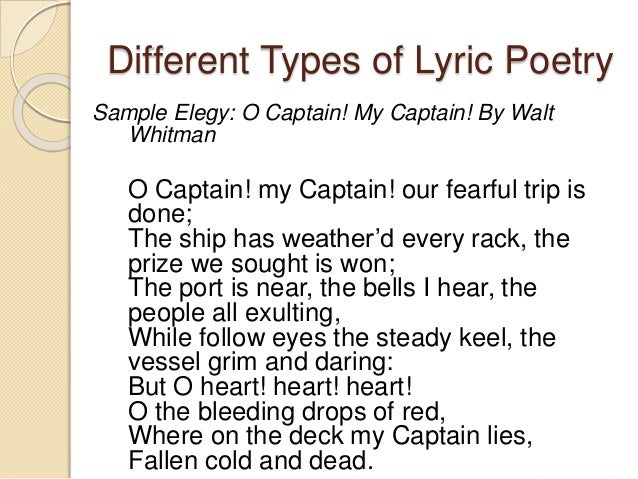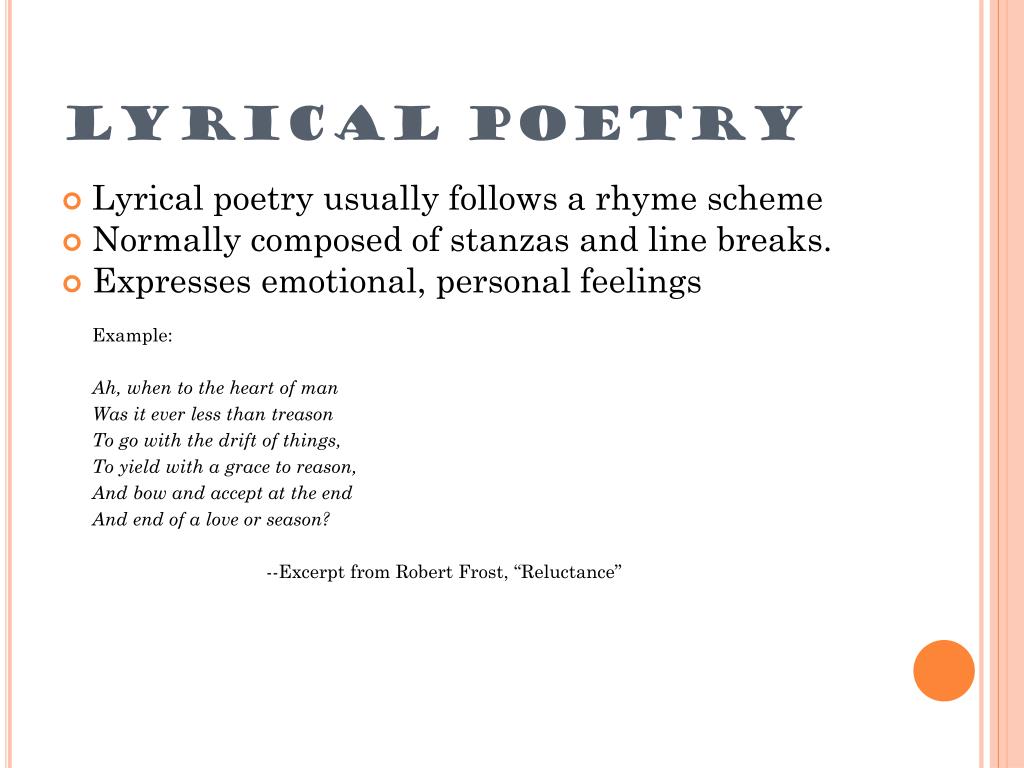
We should question the trustworthiness of the accounting. When reading stories in the first person, we need to realize that what the narrator is recounting might not be the objective truth. In the first person point of view, the narrator does participate in the action of the story. We learn about the characters through this outside voice. Here the narrator does not participate in the action of the story as one of the characters, but lets us know exactly how the characters feel. Point of view – the authors vantage point and the manner of how the story was told. Setting – the place and date where and when the story happened.Ĭonflict – the problem in the story (man vs man, man vs himself, man vs nature. (introduction, conflict, climax, denouement, ending/conclusion)Ĭharacters – the people in the story.

#Types of lyric poetry series
Plot/storyline – subject matter of the story and a series of events of the story. The length of the novel permits a greater number and variety of characters, a more complex plot, and a more elaborate use of the setting. The Novel – more extensive form of prose. Short Story – a brief artistic form of prose fiction which is centered on a single main incident and is intended to produce a single dominant impression which may be sadness, surprise, sympathy, terror or other reactions. Imagined facts which illustrate truths about human life. ZILLMAN, in which the writer is concerned, less with the complete or implied matters of a story, but rather with arousing sympathy or antagonism for, or mere interest in an individual. The Soliloquy – passage spoken by the speaker in a poem or by a character in a play except that there is no one present to hear him except the reader or the audience.Ĭharacter Sketch – poem classified by LAURENCE J. has elements that are closely related to drama because it is written in dramatic form or makes use of dramatic technique.ĭramatic Monologue – combination of drama and poetry which presents the speech of a character in a particular situation at a critical moment.

Metrical Romance – long rambling love story in verse which is centered on the adventures of knights and lords, and their royal ladies during the age of chivalry.Įpic – long, majestic narrative poem which tells the adventures of traditional hero and the development of a nation. The folk, primitive or popular ballads are kinds of ballads which were written anonymously. tells a story following an order of events.īallad – short simple narrative poem composed to be sung, and is orally told from one generation to another. It is exalted in tone, projects deep feelings and expresses high praise for some persons, objects, events or ideas. Ode – most splendid type of lyric poetry. It is solemn and sorrowful, yet it can suggest hope and faith to alleviate sorrow. It was perfected in Italy by FRANCESCO PETRARCA in the 14 th century.Įlegy – poem expressing lament of grief for the dead. Sonnet – lyric poem of 14 lines with formal rhyme. Song – short lyric poem that is intended to be sung and can be set easily to music has a specific melodious quality. Simple lyric – embraces a wide variety of pomes and is characterized by subjectivity, imagination, melody and emotion. Subject and moods of lyric poetry dwell on love, death and grief, religion and feelings, the beauty and love of nature, art, the world of fancy and imagination, the environment and others.

meant to be sung with the accompaniment of a musical instrument known as the LYRE. PROSE – literary masterpiece that is written in the form of ordinary written or spoken language and within the common flow of a conversation. POETRY – refers to those expressions in verse, with measures, rhymes, lines, stanzas, and melodious tone.

Broadly speaking, “literature” is used to describe anything from creative writing to more technical or scientific works, but the term is most commonly used to refer to works of the creative imagination, including works of poetry, drama, fiction, and nonfiction. Literature is a term used to describe written or spoken material.


 0 kommentar(er)
0 kommentar(er)
